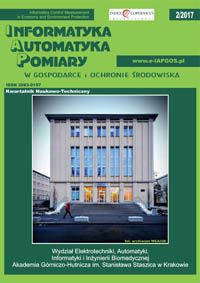IMPLEMENTATION OF THE SYSTEM WWS IS THE REQUIREMENT IN DEVELOPMENT OF ELECTROMOBILITY
Article Sidebar
Issue Vol. 7 No. 2 (2017)
-
TRAFFIC ANALYSIS USING NETFLOW AND PYTHON
Vaclav Oujezsky, Tomas Horvath5-7
-
STUDY OF CONTROL INHOMOGENEITIES OF THE DIELECTRIC BETWEEN METAL PLANES OF MICROWAVE DEVICES IN PHASED ARRAY ANTENNAS
Anton Antonenko, Michael Geraimchuk8-11
-
OPTIMIZATION OF THE SOLAR COLLECTOR’S POSITION
Bogdan Sydorchuk, Oleksandr Naumchuk, Paweł Mazurek12-14
-
E-LABS – ADVANCED E-LEARNING
Jarosław Nowak, Mieczysław Pcian15-18
-
WEB SERVER LATENCY REDUCTION STUDY
Fatma Mbarek, Volodymyr Mosorov, Rafał Wojciechowski19-23
-
TOPOGRAPHY DEPENDENT VERTICAL WIND DISTRIBUTION ESTIMATION
Karolina Lamkowska, Piotr Domagalski24-27
-
SYSTEM FOR VEHICLE ROUTING PROBLEM ALGORITHMS ANALYSIS
Wiktor Sztajerowski, Joanna Ochelska-Mierzejewska, Jacek Kucharski28-31
-
DEVELOPMENT OF THE INTERNET OF THINGS IN POLAND WITH SPECIAL CONSIDERATION OF THE SOCIETY’S AWARENESS OF THE IOT
Szczepan Paszkiel, Maciej Matusik32-35
-
INVESTMENT PROFITABILITY ANALYSIS OF AN ON-GRID PHOTOVOLTAIC SYSTEM
Piotr Szpulak, Szczepan Paszkiel, Stanisław Wawrzyniak, Mirosław Gryszpiński36-39
-
SYNTHESIS OF INTELLECTUAL SUBSYSTEMS OF DYNAMIC DIAGNOSIS OF THE CONDITION OF TURBINE UNITS THERMAL POWER
Alibek Suleimenov , Batyrbek Suleimenov, Oxana Zhirnova, Aituar Suleimenov40-43
-
ANALYSIS OF APPLIED REFERENCE LEADS INFLUENCE ON AN EEG SPECTRUM
Małgorzata Plechawska-Wójcik, Kinga Wesołowska, Martyna Wawrzyk, Monika Kaczorowska, Mikhail Tokovarov44-49
-
PERFORMANCE ANALYSIS OF NATIVE AND CROSS-PLATFORM MOBILE APPLICATIONS
Paweł Grzmil , Maria Skublewska-Paszkowska, Edyta Łukasik, Jakub Smołka50-53
-
ELECTRON SOURCE WITH HOT CATHODE SIMULATOR
Bartosz Kania54-57
-
SMART HOME IMPLEMENTATION COMPARISON ON DIFFERENT HARDWARE PLATFORMS
Piotr Pańczyk, Jakub Smołka58-61
-
THEORETICAL AND EXPERIMENTAL STUDY OF INCOMPRESSIBLE FLUID FLOW THROUGH A SLOTTED ORIFICE
Barbara Tomaszewska62-65
-
ANALYSIS OF INFLUENCE OF NUMERICAL MESH DENSITY ON RESULTS OF SIMULATION OF VON KARMAN VORTEX STREET
Beata Czapla, Mariusz Rząsa66-69
-
INVESTIGATION OF SOIL PARAMETERS FROM WATER AREA
Olena Nesteruk, Mirosław Łabuz, Andrzej Wal70-73
-
CONVERSION EFFICENCY OF THE YAG:CE LUMINOPHORES COOPERATED WITH UV-VIS SEMICONDUTOR EMMITERS
Mateusz Prorok74-77
-
ANALYSIS OF THE USE OF SELECTED ENGINEERING SIMULATION TOOLS FOR MODELING DAYLIGHT
Ewa Piotrowska78-87
-
ANOMALIES IN MODELLING BUSINESS PROCESS
Anna Suchenia, Antoni Ligęza88-93
-
CONCEPT OF CONTROL SYSTEM FOR HYBRID ELECTROMAGNETIC LAUNCHER WITH USE OF REAL TIME CONTROLLER
Tomasz Makowski94-97
-
IMPLEMENTATION OF THE SYSTEM WWS IS THE REQUIREMENT IN DEVELOPMENT OF ELECTROMOBILITY
Krzysztof Polakowski98-101
-
EMOTION RECOGNITION IN POLISH TEXTS BASED ON KEYWORDS DETECTION METHOD
Adrian Maciej Nowaczyk, Lidia Jackowska-Strumiłło102-105
-
CONSTRUCTION OF VACUUM CIRCUIT-BREAKER FOR 7.2 KV
Artur Hejduk106-109
-
ANALYSIS OF LOGARITHMIC ANALOG-TO-DIGITAL CONVERTER WITH SUCCESSIVE APPROXIMATION TAKING INTO ACCOUNT PARASITIC CAPACITANCES
Adam Szcześniak, Zynowij Myczuda110-114
-
CONSTRUCTION SOLUTIONS ROTATIONAL MOLDING MACHINES POLYMER MATERIALS
Karolina Głogowska115-118
-
TESTING FOR REVEALING OF DATA STRUCTURE BASED ON THE HYBRID APPROACH
Volodymyr Mosorov, Taras Panskyi, Sebastian Biedron119-122
Archives
-
Vol. 9 No. 4
2019-12-16 20
-
Vol. 9 No. 3
2019-09-26 20
-
Vol. 9 No. 2
2019-06-21 16
-
Vol. 9 No. 1
2019-03-03 13
-
Vol. 8 No. 4
2018-12-16 16
-
Vol. 8 No. 3
2018-09-25 16
-
Vol. 8 No. 2
2018-05-30 18
-
Vol. 8 No. 1
2018-02-28 18
-
Vol. 7 No. 4
2017-12-21 23
-
Vol. 7 No. 3
2017-09-30 24
-
Vol. 7 No. 2
2017-06-30 27
-
Vol. 7 No. 1
2017-03-03 33
-
Vol. 6 No. 4
2016-12-22 16
-
Vol. 6 No. 3
2016-08-08 18
-
Vol. 6 No. 2
2016-05-10 16
-
Vol. 6 No. 1
2016-02-04 16
-
Vol. 5 No. 4
2015-10-28 19
-
Vol. 5 No. 3
2015-09-02 17
-
Vol. 5 No. 2
2015-06-30 15
-
Vol. 5 No. 1
2015-03-31 18
Main Article Content
DOI
Authors
Abstract
Rapidly is growing negative impact of toxic emissions of internal combustion engines (used in road transport), on the ecosystem. Apart from the problems associated with air pollution and the environment at the stage of extraction, transport and processing of liquid and gaseous hydrocarbon fossil fuels, the biggest problem is with the mass poisoning the atmosphere by products emanating from the exhaust pipes of all (land, sea and air) means of transport. Electric drive can be an effective remedy for these negative effects. Electric motors are practically emission-free and in terms of efficiency, in the conversion electrical energy into mechanical, three times superior to heat engines. In order electric trucks have been fully ecological, energy required to charge the energy containers, in the form of electrochemical batteries, must come from renewable energy sources. The basic condition for the development of electromobility based on the electric car is the need for widespread and rapid transition to production of electricity from carbon-free renewable energy sources: wind, water and sun. Published (by one of the world's leading scientific centers) results of research and analyzes show that there is a real chance to create an alternative (to the traditional system of generating electricity, based mainly on thermal power plants burning fuels), the new zero-emission system WWS (Wind, Water, Sun), based on the use of the energy contained in the wind, flowing water, and solar radiation. The presented data show that there is a real chance of transition to WWS in the next 30 – 50 years.
Keywords:
References
BP, BP Statistical World Energy Review, 2014.
Chu J.: Study: Air pollution causes 200,000 early deaths each year in the U.S, MIT News Office, 2013.
Heywood J. B.: Tabor na diecie. Świat Nauki 182/2006, 34–38.
Inman M.: Prawdziwa cena paliw kopalnych. Świat Nauki 261/2013, 45–47.
Jacobson M. Z., Delucchi M. A.: Moc trzech żywiołów. Świat nauki 220/2009, 58–65.
Lawler R.: Tesla's 90 second battery swaps will power EVs faster than gas pumps fill tanks, http://www.engadget.com/2013/06/21/tesla-motors-battery-swaps-faster-than-gas/
Mehrdad E., Gao Y., Emadi A.: Modern Electric, Hybrid Electric and Fuel Cell Vehicles. New York, CRC Press 2010.
Zorpette G.: W oczekiwaniu na super samochód. Świat Nauki 94/1999, 20–22.
http://www.industrytap.com/goodyear-trying-make-tires-will-generate-electricity/35478.
Article Details
Abstract views: 354
License

This work is licensed under a Creative Commons Attribution-ShareAlike 4.0 International License.






